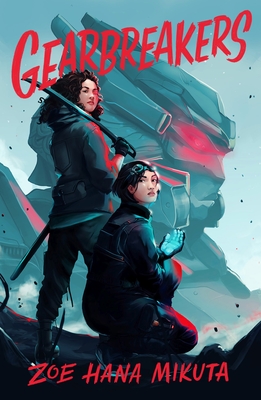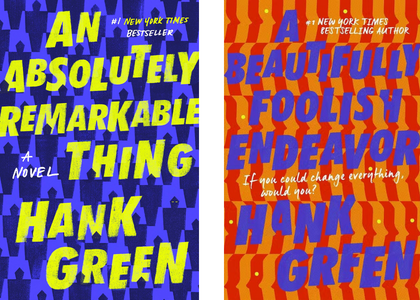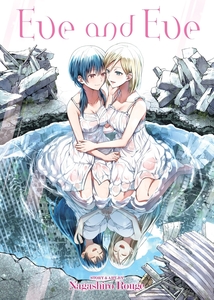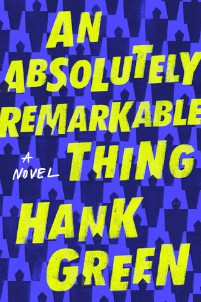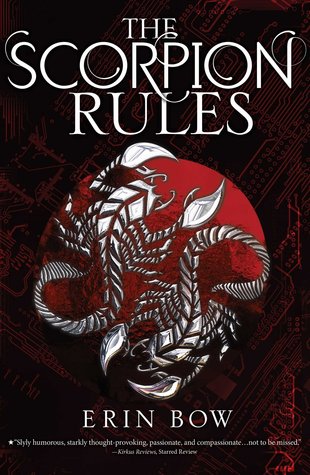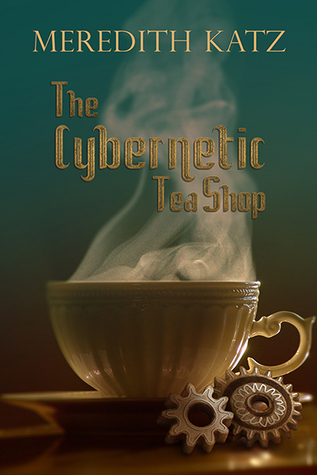If you’re looking for a fun one-sitting read, why not pick up this trans lesbian “mech rom-com graphic novel,” as the blurb describes it? I feel like you’re already sold, but I’ll keep going anyway. LSBN is a project to develop a mech suit to battle the giant, monstrous aliens that have descended to Earth.Read More
Pacific Rim Meets Crier’s War: Gearbreakers by Zoe Hana Mikuta
Gearbreakers by Zoe Hana Mikuta is one of those books that somehow passed me by when it came out in 2021. It follows two teenage girls, Sona and Eris, as they try to destroy the Godolia empire from the inside: Sona as one of the students from the Academy who earns a spot as a frighteningRead More
Kelleen reviews An Absolutely Remarkable Thing and A Beautifully Foolish Endeavor by Hank Green
Amazon Affiliate Link | Bookshop.org Affiliate Link I am in the middle of THE most epic reading slump this summer. I haven’t been reading a tenth of what I usually do, and the genres and storylines that usually capture my attention just aren’t doing it for me right now. But I’ve read these books 3.5Read More
Cath reviews The Cybernetic Tea Shop by Meredith Katz
Amazon Affiliate Link | Bookshop.org Affiliate Link The Cybernetic Tea Shop has been one of my comfort reads for years now, one of those stories I can reread over and over. Clara Gutierrez is a technician for Raises — small, animal-shaped robotic companions with a limited range of intelligence and emotions. She doesn’t like settling downRead More
Til reviews Gearbreakers by Zoe Hana Mikuta
Amazon Affiliate Link | Bookshop.org Affiliate Link Gearbreakers bounces between high-octane mecha fights, rebellion, intense emotions, and savage banter. It’s a story about a wasteland outside a glittering, high-tech city. It has plot twists and schemes, and characters always willing to break the rules. And somehow, it manages to be overwhelmingly dull. The action scenes shineRead More
Susan reviews Eve and Eve by Nagashiro Rouge
Amazon Affiliate Link | Bookshop.org Affiliate Link I believe the entire summary I gave of Eve and Eve on GoodReads was “This is the level of weird horniness I usually find in m/m manga and I almost respect it for that.” The actual summary is that Eve and Eve is Nagashiro Rouge’s single-creator anthology ofRead More
Danika reviews An Absolutely Remarkable Thing by Hank Green
About three years ago, I saw a post on tumblr from Hank Green, which read: “Remember when I said I was writing a story about a bisexual girl and a robot?” I was, of course, immediately intrigued. I’ve been following the Vlogbrothers for many years, and I’ve read almost all of John Green’s books (thoughRead More
Danika reviews The Swan Riders by Erin Bow
After hearing only good things about the Scorpion Rules duology, I was eager to pick it up. Unfortunately, I read the first book during a readathon, and reading a crushing dystopian story about war and brutality was not the best choice to read all in one sitting. It was darker than I was expecting, so I wasn’tRead More
Danika reviews The Scorpion Rules by Erin Bow
If you’ve been looking for the queer Hunger Games (or, at least, queer Mockingjay), this is the book for you. Do you want to read about crushing oppression and the horrors of war, but with a bisexual protagonist? The Scorpion Rules is the book for you! This was a bad choice for a readathon. I should have seenRead More
Danika reviews The Cybernetic Tea Shop by Meredith Katz
I’ve got to say, with a title like “The Cybernetic Tea Shop,” I expected this to be a fun, silly, quick read. Instead, it was thoughtful and quiet, seeming to take up more space than the pages it occupied. This is set in a world where sentient, sapient robots were once mass-produced, but given theRead More

